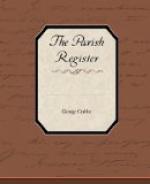If all it pays for Heaven’s eternal year;
If these sad sobs and piteous sighs secure
Delights that live, when worlds no more endure?
The sister-spirit long may lodge below,
And pains from nature, pains from reason, know:
Through all the common ills of life may run,
By hope perverted and by love undone;
A wife’s distress, a mother’s pangs, may dread,
And widow-tears, in bitter anguish, shed;
May at old age arrive through numerous harms,
With children’s children in those feeble arms:
Nor till by years of want and grief oppress’d
Shall the sad spirit flee and be at rest!
Yet happier therefore shall we deem the boy,
Secured from anxious care and dangerous joy?
Not so! for then would Love Divine in vain
Send all the burthens weary men sustain;
All that now curb the passions when they rage,
The checks of youth and the regrets of age;
All that now bid us hope, believe, endure,
Our sorrow’s comfort and our vice’s cure;
All that for Heaven’s high joys the spirits train,
And charity, the crown of all, were vain.
Say, will you call the breathless infant blest,
Because no cares the silent grave molest?
So would you deem the nursling from the wing
Untimely thrust and never train’d to sing;
But far more blest the bird whose grateful voice
Sings its own joy and makes the woods rejoice,
Though, while untaught, ere yet he charm’d the ear,
Hard were his trials and his pains severe!
Next died the lady who yon Hall possess’d,
And here they brought her noble bones to rest.
In Town she dwelt;—forsaken stood the Hall:
Worms ate the floors, the tap’stry fled the wall:
No fire the kitchen’s cheerless grate display’d;
No cheerful light the long-closed sash convey’d:
The crawling worm, that turns a summer fly,
Here spun his shroud and laid him up to die
The winter-death:- upon the bed of state,
The bat shrill shrieking woo’d his flickering mate;
To empty rooms the curious came no more;
From empty cellars turn’d the angry poor,
And surly beggars cursed the ever-bolted door.
To one small room the steward found his way
Where tenants follow’d to complain and pay;
Yet no complaint before the Lady came,
The feeling servant spared the feeble dame;
Who saw her farms with his observing eyes,
And answer’d all requests with his replies; —
She came not down, her falling groves to view;
Why should she know, what one so faithful knew?
Why come, from many clamorous tongues to hear,
What one so just might whisper in her ear?
Her oaks or acres, why with care explore;
Why learn the wants, the sufferings of the poor;
When one so knowing all their worth could trace,
And one so piteous govern’d in her place?
Lo! now, what dismal Sons of Darkness come,
To bear this Daughter of Indulgence home;
Tragedians all, and well-arranged in black!
If these sad sobs and piteous sighs secure
Delights that live, when worlds no more endure?
The sister-spirit long may lodge below,
And pains from nature, pains from reason, know:
Through all the common ills of life may run,
By hope perverted and by love undone;
A wife’s distress, a mother’s pangs, may dread,
And widow-tears, in bitter anguish, shed;
May at old age arrive through numerous harms,
With children’s children in those feeble arms:
Nor till by years of want and grief oppress’d
Shall the sad spirit flee and be at rest!
Yet happier therefore shall we deem the boy,
Secured from anxious care and dangerous joy?
Not so! for then would Love Divine in vain
Send all the burthens weary men sustain;
All that now curb the passions when they rage,
The checks of youth and the regrets of age;
All that now bid us hope, believe, endure,
Our sorrow’s comfort and our vice’s cure;
All that for Heaven’s high joys the spirits train,
And charity, the crown of all, were vain.
Say, will you call the breathless infant blest,
Because no cares the silent grave molest?
So would you deem the nursling from the wing
Untimely thrust and never train’d to sing;
But far more blest the bird whose grateful voice
Sings its own joy and makes the woods rejoice,
Though, while untaught, ere yet he charm’d the ear,
Hard were his trials and his pains severe!
Next died the lady who yon Hall possess’d,
And here they brought her noble bones to rest.
In Town she dwelt;—forsaken stood the Hall:
Worms ate the floors, the tap’stry fled the wall:
No fire the kitchen’s cheerless grate display’d;
No cheerful light the long-closed sash convey’d:
The crawling worm, that turns a summer fly,
Here spun his shroud and laid him up to die
The winter-death:- upon the bed of state,
The bat shrill shrieking woo’d his flickering mate;
To empty rooms the curious came no more;
From empty cellars turn’d the angry poor,
And surly beggars cursed the ever-bolted door.
To one small room the steward found his way
Where tenants follow’d to complain and pay;
Yet no complaint before the Lady came,
The feeling servant spared the feeble dame;
Who saw her farms with his observing eyes,
And answer’d all requests with his replies; —
She came not down, her falling groves to view;
Why should she know, what one so faithful knew?
Why come, from many clamorous tongues to hear,
What one so just might whisper in her ear?
Her oaks or acres, why with care explore;
Why learn the wants, the sufferings of the poor;
When one so knowing all their worth could trace,
And one so piteous govern’d in her place?
Lo! now, what dismal Sons of Darkness come,
To bear this Daughter of Indulgence home;
Tragedians all, and well-arranged in black!




